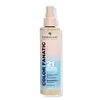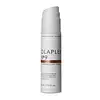What's inside
What's inside
 Key Ingredients
Key Ingredients

 Benefits
Benefits

 Concerns
Concerns

 Ingredients Side-by-side
Ingredients Side-by-side

Water
Skin ConditioningCocos Nucifera Oil
MaskingAmodimethicone
Polyquaternium-37
PPG-5-Ceteth-10 Phosphate
EmulsifyingPhenoxyethanol
PreservativePropylene Glycol Dicaprylate/Dicaprate
EmollientAcetamide Mea
HumectantSodium Hydroxide
BufferingParfum
MaskingLactamide Mea
HumectantDimethicone
EmollientPPG-1 Trideceth-6
Skin ConditioningButylene Glycol
HumectantTrideceth-6
EmulsifyingBehentrimonium Chloride
PreservativeXylose
HumectantEthylhexylglycerin
Skin ConditioningHelianthus Annuus Seed Extract
Skin ConditioningSorbitan Oleate
EmulsifyingLinalool
PerfumingDimethiconol
EmollientBenzophenone-4
UV AbsorberIsopropyl Alcohol
SolventCetrimonium Chloride
AntimicrobialTocopherol
AntioxidantCamelina Sativa Seed Oil
Skin ConditioningAscorbyl Glucoside
AntioxidantOlea Europaea Fruit Oil
MaskingBenzyl Alcohol
PerfumingGeraniol
PerfumingCitronellol
PerfumingBenzyl Salicylate
PerfumingHydrolyzed Vegetable Protein Pg-Propyl Silanetriol
Skin ConditioningIsoeugenol
PerfumingBHT
AntioxidantMelanin
Skin ProtectingSodium Benzoate
MaskingPentylene Glycol
Skin ConditioningPotassium Sorbate
PreservativeCitric Acid
BufferingWater, Cocos Nucifera Oil, Amodimethicone, Polyquaternium-37, PPG-5-Ceteth-10 Phosphate, Phenoxyethanol, Propylene Glycol Dicaprylate/Dicaprate, Acetamide Mea, Sodium Hydroxide, Parfum, Lactamide Mea, Dimethicone, PPG-1 Trideceth-6, Butylene Glycol, Trideceth-6, Behentrimonium Chloride, Xylose, Ethylhexylglycerin, Helianthus Annuus Seed Extract, Sorbitan Oleate, Linalool, Dimethiconol, Benzophenone-4, Isopropyl Alcohol, Cetrimonium Chloride, Tocopherol, Camelina Sativa Seed Oil, Ascorbyl Glucoside, Olea Europaea Fruit Oil, Benzyl Alcohol, Geraniol, Citronellol, Benzyl Salicylate, Hydrolyzed Vegetable Protein Pg-Propyl Silanetriol, Isoeugenol, BHT, Melanin, Sodium Benzoate, Pentylene Glycol, Potassium Sorbate, Citric Acid
Water
Skin ConditioningPropanediol
SolventBetaine
HumectantQuaternium-22
Bis-Aminopropyl Diglycol Dimaleate
Skin ConditioningSodium Hyaluronate
HumectantCetrimonium Chloride
AntimicrobialPanthenol
Skin ConditioningHydroxyethylcellulose
Emulsion StabilisingPvp
Emulsion StabilisingGuar Hydroxypropyltrimonium Chloride
Skin ConditioningFurcellaria Lumbricalis Extract
Skin ConditioningPelvetia Canaliculata Extract
Skin ProtectingXylitylglucoside
HumectantPolyquaternium-44
Anhydroxylitol
HumectantMaltitol
HumectantCitric Acid
BufferingTrisodium Ethylenediamine Disuccinate
Xylitol
HumectantEthylhexylglycerin
Skin ConditioningSodium Hydroxide
BufferingSorbic Acid
PreservativePhenoxyethanol
PreservativeSodium Benzoate
MaskingParfum
MaskingCitral
PerfumingCitronellol
PerfumingHexyl Cinnamal
PerfumingLimonene
PerfumingLinalool
PerfumingWater, Propanediol, Betaine, Quaternium-22, Bis-Aminopropyl Diglycol Dimaleate, Sodium Hyaluronate, Cetrimonium Chloride, Panthenol, Hydroxyethylcellulose, Pvp, Guar Hydroxypropyltrimonium Chloride, Furcellaria Lumbricalis Extract, Pelvetia Canaliculata Extract, Xylitylglucoside, Polyquaternium-44, Anhydroxylitol, Maltitol, Citric Acid, Trisodium Ethylenediamine Disuccinate, Xylitol, Ethylhexylglycerin, Sodium Hydroxide, Sorbic Acid, Phenoxyethanol, Sodium Benzoate, Parfum, Citral, Citronellol, Hexyl Cinnamal, Limonene, Linalool
 Reviews
Reviews

Ingredients Explained
These ingredients are found in both products.
Ingredients higher up in an ingredient list are typically present in a larger amount.
This ingredient is a preservative, antimicrobial, and emulsifier. It is often used in cosmetics for its ability to cleanse, condition, and reduce static.
Cetrimonium chloride is a quaternary ammonium salt, meaning it has a water-soluble structure.
Citric Acid is an alpha hydroxy acid (AHA) naturally found in citrus fruits like oranges, lemons, and limes.
Like other AHAs, citric acid can exfoliate skin by breaking down the bonds that hold dead skin cells together. This helps reveal smoother and brighter skin underneath.
However, this exfoliating effect only happens at high concentrations (20%) which can be hard to find in cosmetic products.
Due to this, citric acid is usually included in small amounts as a pH adjuster. This helps keep products slightly more acidic and compatible with skin's natural pH.
In skincare formulas, citric acid can:
While it can provide some skin benefits, research shows lactic acid and glycolic acid are generally more effective and less irritating exfoliants.
Most citric acid used in skincare today is made by fermenting sugars (usually from molasses). This synthetic version is identical to the natural citrus form but easier to stabilize and use in formulations.
Read more about some other popular AHA's here:
Learn more about Citric AcidCitronellol is used to add fragrance/parfum to a product. It is often derived from plants such as roses. In fact, it can be found in many essential oils including geranium, lavender, neroli, and more. The scent of Citronellol is often described as "fresh, grassy, and citrus-like".
Since the Citronellol molecule is already unstable, Citronellol becomes irritating on the skin when exposed to air.
Citronellol is a modified terpene. Terpenes are unsaturated hydrocarbons found in plants. They make up the primary part of essential oils.
Citronellol is not able to be absorbed into deeper layers of the skin. It has low permeability,
Citronellol is also a natural insect repellent.
Learn more about CitronellolEthylhexylglycerin (we can't pronounce this either) is commonly used as a preservative and skin softener. It is derived from glyceryl.
You might see Ethylhexylglycerin often paired with other preservatives such as phenoxyethanol. Ethylhexylglycerin has been found to increase the effectiveness of these other preservatives.
Linalool is a fragrance and helps add scent to products. It's derived from common plants such as cinnamon, mint, citrus, and lavender.
Like Limonene, this ingredient oxidizes when exposed to air. Oxidized linalool can cause allergies and skin sensitivity.
This ingredient has a scent that is floral, spicy tropical, and citrus-like.
Learn more about LinaloolParfum is a catch-all term for an ingredient or more that is used to give a scent to products.
Also called "fragrance", this ingredient can be a blend of hundreds of chemicals or plant oils. This means every product with "fragrance" or "parfum" in the ingredients list is a different mixture.
For instance, Habanolide is a proprietary trade name for a specific aroma chemical. When used as a fragrance ingredient in cosmetics, most aroma chemicals fall under the broad labeling category of “FRAGRANCE” or “PARFUM” according to EU and US regulations.
The term 'parfum' or 'fragrance' is not regulated in many countries. In many cases, it is up to the brand to define this term.
For instance, many brands choose to label themselves as "fragrance-free" because they are not using synthetic fragrances. However, their products may still contain ingredients such as essential oils that are considered a fragrance by INCI standards.
One example is Calendula flower extract. Calendula is an essential oil that still imparts a scent or 'fragrance'.
Depending on the blend, the ingredients in the mixture can cause allergies and sensitivities on the skin. Some ingredients that are known EU allergens include linalool and citronellol.
Parfum can also be used to mask or cover an unpleasant scent.
The bottom line is: not all fragrances/parfum/ingredients are created equally. If you are worried about fragrances, we recommend taking a closer look at an ingredient. And of course, we always recommend speaking with a professional.
Learn more about ParfumPhenoxyethanol is a preservative that has germicide, antimicrobial, and aromatic properties. Studies show that phenoxyethanol can prevent microbial growth. By itself, it has a scent that is similar to that of a rose.
It's often used in formulations along with Caprylyl Glycol to preserve the shelf life of products.
Sodium Benzoate is a preservative. It's used in both cosmetic and food products to inhibit the growth of mold and bacteria. It is typically produced synthetically.
Both the US FDA and EU Health Committee have approved the use of sodium benzoate. In the US, levels of 0.1% (of the total product) are allowed.
Sodium benzoate works as a preservative by inhibiting the growth of bacteria inside of cells. It prevents the cell from fermenting a type of sugar using an enzyme called phosphofructokinase.
It is the salt of benzoic acid. Foods containing sodium benzoate include soda, salad dressings, condiments, fruit juices, wines, and snack foods.
Studies for using ascorbic acid and sodium benzoate in cosmetics are lacking, especially in skincare routines with multiple steps.
We always recommend speaking with a professional, such as a dermatologist, if you have any concerns.
Learn more about Sodium BenzoateSodium Hydroxide is also known as lye or caustic soda. It is used to adjust the pH of products; many ingredients require a specific pH to be effective.
In small amounts, sodium hydroxide is considered safe to use. However, large amounts may cause chemical burns due to its high alkaline.
Your skin has a natural pH and acid mantle. This acid mantle helps prevent harmful bacteria from breaking through. The acid mantle also helps keep your skin hydrated.
"Alkaline" refers to a high pH level. A low pH level would be considered acidic.
Learn more about Sodium HydroxideWater. It's the most common cosmetic ingredient of all. You'll usually see it at the top of ingredient lists, meaning that it makes up the largest part of the product.
So why is it so popular? Water most often acts as a solvent - this means that it helps dissolve other ingredients into the formulation.
You'll also recognize water as that liquid we all need to stay alive. If you see this, drink a glass of water. Stay hydrated!
Learn more about Water